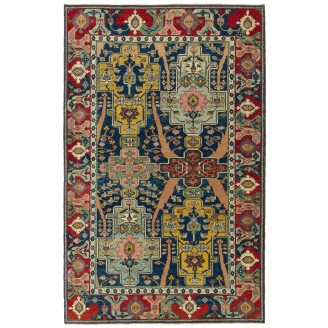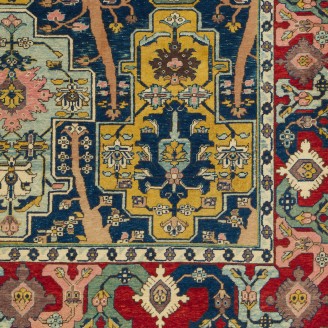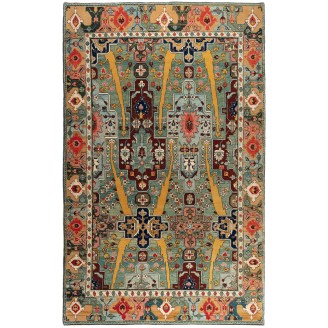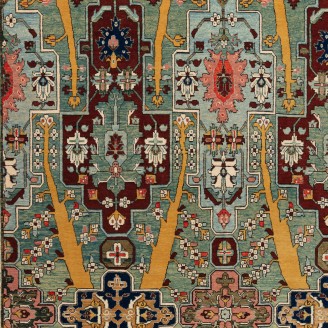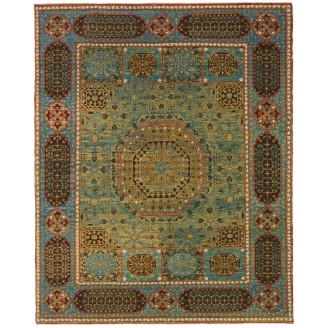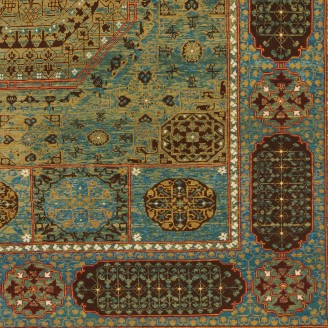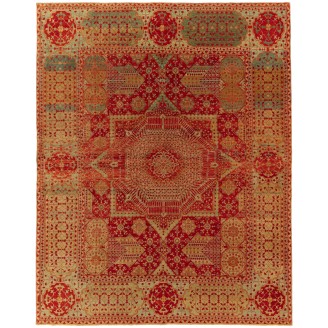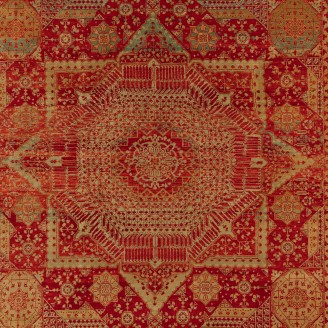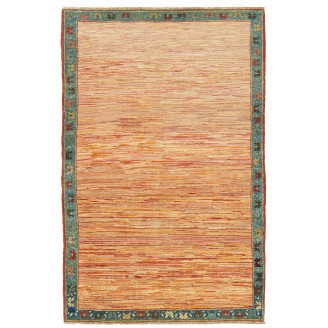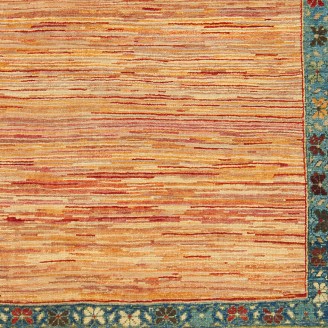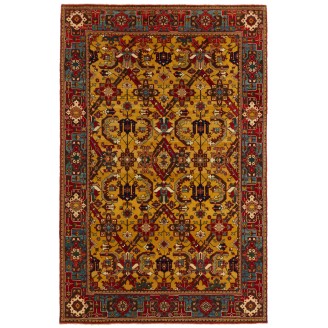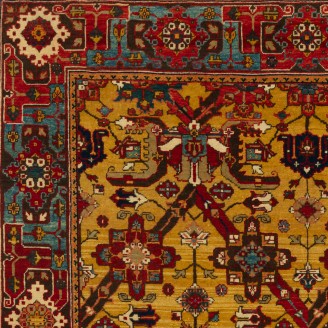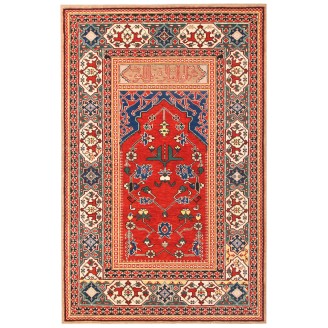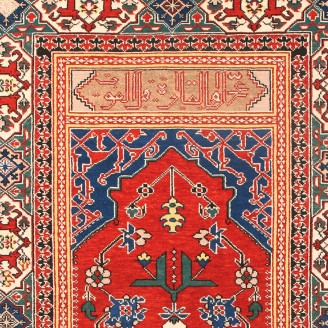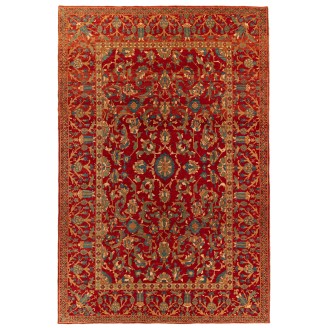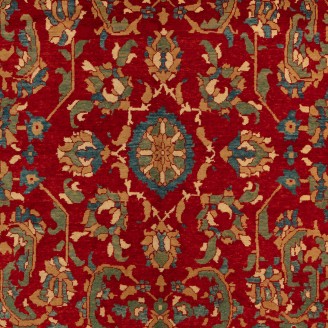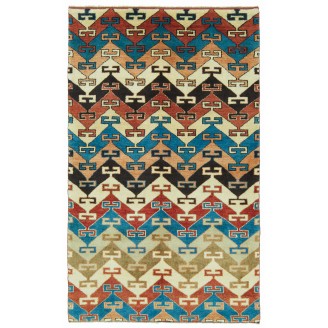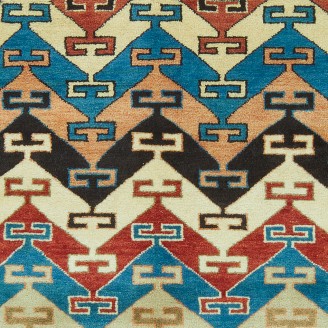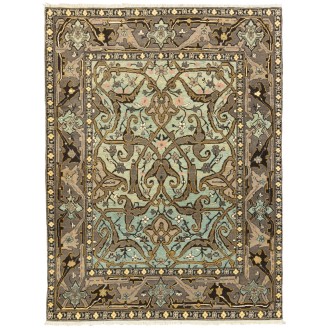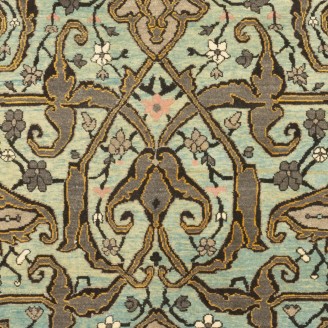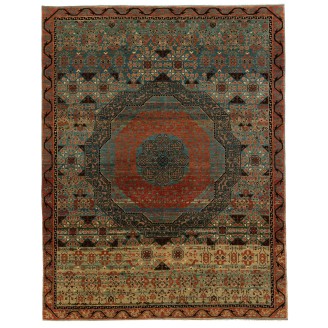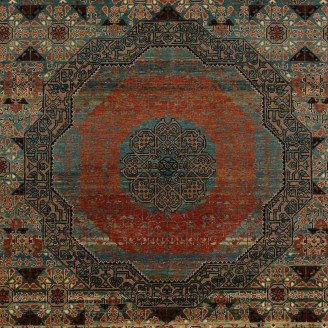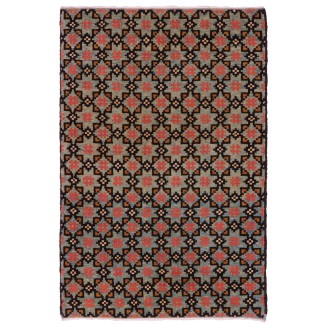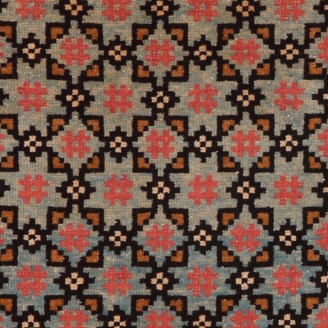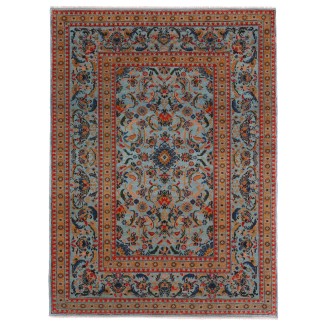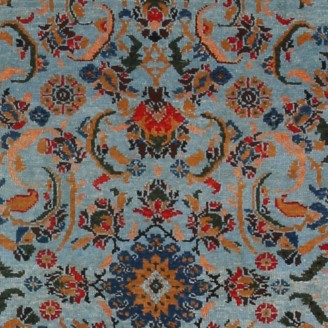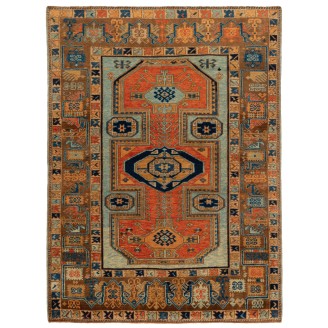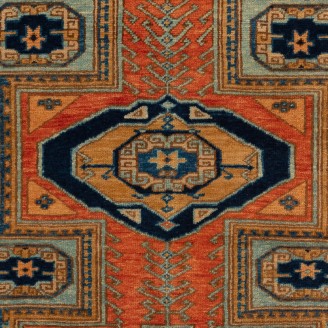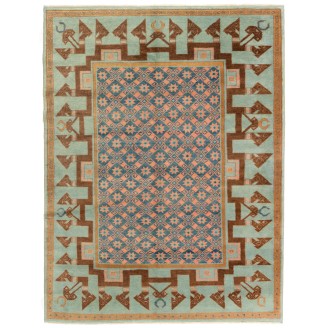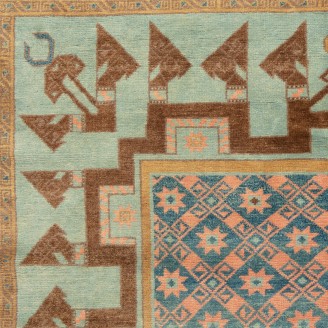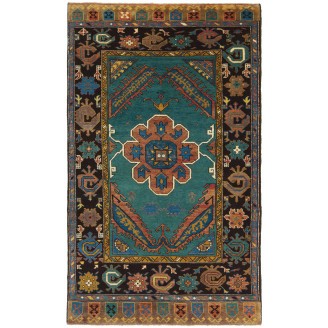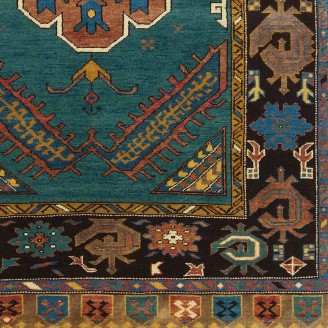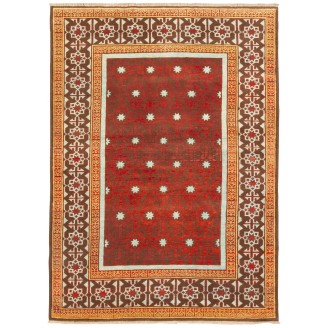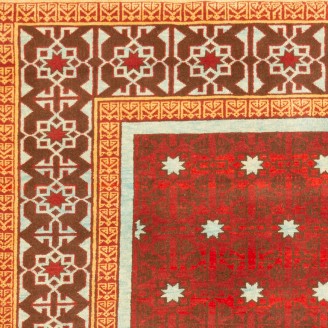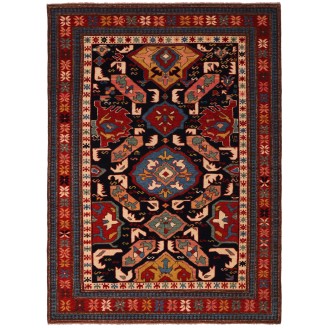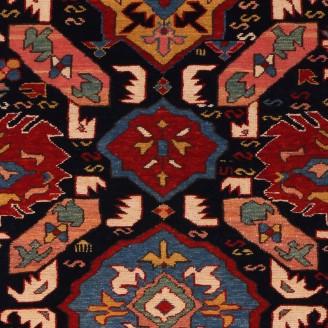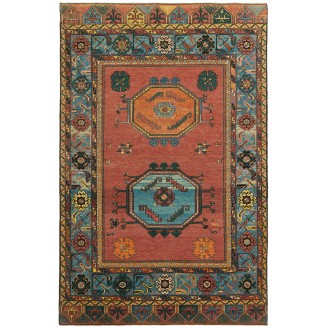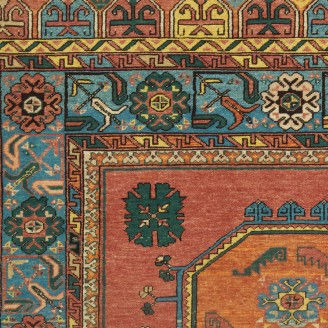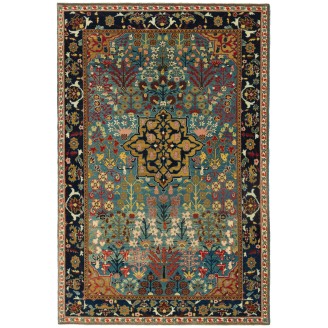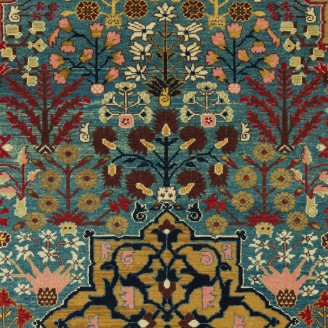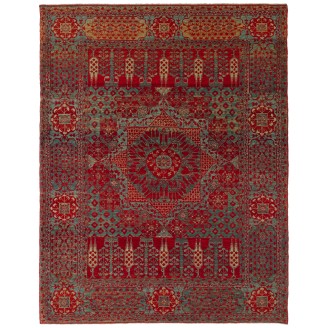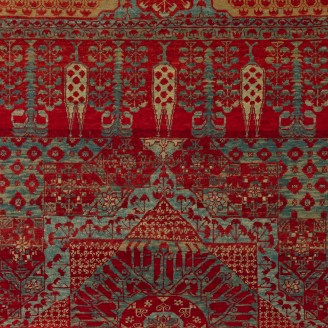Model: ART00486
Dimensions: 4'8" X 7'3"(143cm x 222cm)
The source of carpet comes from the book Orient Star - A Carpet Collection, E. Heinrich Kirchheim, Hali Publications Ltd, 1993 nr.64 and Islamic Carpets, Joseph V. McMullan, Near Eastern Art Research Center Inc., New York 1965 nr.26. This is a long Khorassan Compartment and tree design 17th-century ..
Price:
$6,000
Ex Tax:$6,000
Model: ART00315
Dimensions: 6'6" X 10'5"(200cm x 319cm)
The source of carpet comes from the book Orient Star - A Carpet Collection, E. Heinrich Kirchheim, Hali Publications Ltd, 1993 nr.64 and Islamic Carpets, Joseph V. McMullan, Near Eastern Art Research Center Inc., New York 1965 nr.26. This is a long Khorassan Compartment and tree design 17th-century ..
Price:
$11,800
Ex Tax:$11,800
Model: ART00474
Dimensions: 6'1" X 7'6"(187cm x 230cm)
The source of carpet comes from the book How to Read - Islamic Carpets, Walter B. Denny, The Metropolitan Museum of Art, New York 2014 fig.61,62. The five-star-medallion carpet was designed in the early 16th century by Mamluk Sultane of Cairo, Egypt. It is exhibited at The Metropolitan Museum of Art..
Price:
$7,500
Ex Tax:$7,500
Model: ART00058
Dimensions: 8'4" X 10'4"(254cm x 316cm)
The source of carpet comes from the book How to Read - Islamic Carpets, Walter B. Denny, The Metropolitan Museum of Art, New York 2014 fig.61,62. The five-star-medallion carpet was designed in the early 16th century by Mamluk Sultane of Cairo, Egypt. It is exhibited at The Metropolitan Museum of Art..
Price:
$14,400
Ex Tax:$14,400
Model: ART00188
Dimensions: 3'3" X 5'1"(100cm x 156cm)
This unique design rug is interpreted by our designers with a mixture of Ararat Rugs’ soft tone natural dyed hand-spun yarns.Color summary: 11 colors in total, most used 4 colors are;Mix of Pink YarnsDusty Turquoise 340 (Spurge - Madder Root - Indigo - Walnut Husk) Green Blue 344 (Spurge - Madder ..
Price:
$1,800
Ex Tax:$1,800
Model: ART00502
Dimensions: 4'11" X 7'5"(151cm x 228cm)
The source of carpet comes from the book Orient Star - A Carpet Collection, E. Heinrich Kirchheim, Hali Publications Ltd, 1993 nr.63. This is a lattice design 17th-century carpet from Khorasan, Eastern Persia. Dr. Friedrich Spuhler was formerly Curator of Islamic Art in Berlin-Dahlem. In 1978 he bec..
Price:
$6,870
Ex Tax:$6,870
Model: ART00053
Dimensions: 4'2" X 6'3"(127cm x 192cm)
Carpets called Siebenburgen or Transylvanian are those which have been found in the Protestant churches of Siebenburgen. Some of them carry a label on the back stating where, when and by whom the piece has been donated to the church. Siebenbürgen/Transylvania is an area between the South and the Eas..
Price:
$4,600
Ex Tax:$4,600
Model: ART00039
Dimensions: 6'2" X 9'6"(188cm x 290cm)
Turkish Court Manufactury Rugs were woven in the Egyptian workshops founded by the Ottoman Empire in the 16th century. Those carpets were woven in Egypt, following the paper cartoons probably created in Istanbul and sent to Cairo at that time. Shortly after its conquest by the Osmanli Turks (1517), ..
Price:
$9,400
Ex Tax:$9,400
Model: ART00368
Dimensions: 3'4" X 5'7"(104cm x 171cm)
The source of the rug comes from the book Orient Star - A Carpet Collection, E. Heinrich Kirchheim, Hali Publications Ltd, 1993 nr.181. This is an unusual zig-zag line design 17th-century rug from the Konya region, Central Anatolia area, Turkey. This is a unique example of an Anatolian Village rug w..
Price:
$2,000
Ex Tax:$2,000
Model: ART00321
Dimensions: 4'10" X 6'5"(149cm x 197cm)
The source of rug comes from the book Antique Rugs of Kurdistan A Historical Legacy of Woven Art, James D. Burns, 2002 nr.33. This is a fine Kurdish workshop rug with split-palmette and trefoil arabesque patterns designed mid-19th century rug from Senna or Garrus, Eastern Kurdistan area. This design..
Price:
$5,400
Ex Tax:$5,400
Model: ART00390
Dimensions: 4'11" X 6'5"(152cm x 197cm)
The design source of the rug comes from The C. L. David Collection, Copenhagen. This rug with the Cusped Medallion was designed in the early 16th-century rug by Mamluk Sultane of Cairo, Egypt. Once in the Hirth Collection, and later with Ulrich Schürmann in 1965, this piece now belongs to the David ..
Price:
$5,100
Ex Tax:$5,100
Model: ART00255
Dimensions: 1'9" X 2'8"(55cm x 82cm)
The source of carpet comes from the book Turkish Carpets from the 13th - 18th centuries, Ahmet Ertuğ, 1996 pl.16. This 15th-century carpet is from Ulu Mosque, Divrigi Sivas region, central Anatolia. The Seljuk period marks one of the highest points in art and architecture in carpets Anatolia. It is ..
Price:
$825
Ex Tax:$825
Model: ART00304
Dimensions: 4'0" X 5'4"(122cm x 164cm)
Turkish Court Manufactury Rugs were woven in the Egyptian workshops founded by the Ottoman Empire in the 16th century. Those carpets were woven in Egypt, following the paper cartoons probably created in Istanbul and sent to Cairo at that time. Shortly after its conquest by the Osmanli Turks (1517), ..
Price:
$3,400
Ex Tax:$3,400
Model: ART00409
Dimensions: 4'5" X 6'0"(136cm x 183cm)
The source of the rug comes from the book Orient Star - A Carpet Collection, E. Heinrich Kirchheim, Hali Publications Ltd, 1993 nr.172. This is a unique, lacking of formal arrangement design 18th-century rug from the Central Anatolia area, Turkey. The field drawing is gardens with a pond with Ladik ..
Price:
$3,400
Ex Tax:$3,400
Model: ART00388
Dimensions: 5'8" X 7'4"(174cm x 225cm)
The source of the carpet comes from the book Orient Stars Collection, Anatolian Tribal Rugs 1050-1750, Michael Franses, Hali Publications Ltd, 2021 fig.24. This 13th-century carpet is from probably the Konya region, central Anatolia, circa 1200-1300 (C 1290-1420). It is exhibited at the Museum of Et..
Price:
$4,700
Ex Tax:$4,700
Model: ART00363
Dimensions: 4'1" X 6'8"(125cm x 205cm)
The source of carpet comes from the book Orient Star - A Carpet Collection, E. Heinrich Kirchheim, Hali Publications Ltd, 1993 nr.178. This is an unusual border drawing, medallion carpet design 16th-century carpet from the Konya region, Central Anatolia area, Turkey. A detail in the border drawing i..
Price:
$2,900
Ex Tax:$2,900
Model: ART00348
Dimensions: 5'4" X 7'4"(165cm x 226cm)
The source of carpet comes from the book Orient Stars Collection, Anatolian Tribal Rugs 1050-1750, Michael Franses, Hali Publications Ltd, 2021 fig.23. This 13th-century carpet is from probably the Konya region, central Anatolia, circa 1200-1300 (C 1290-1420). It is exhibited at the Museum of Turkis..
Price:
$4,500
Ex Tax:$4,500
Model: ART00448
Dimensions: 3'8" X 5'0"(113cm x 154cm)
The source of the rug comes from the book Orient Star - A Carpet Collection, E. Heinrich Kirchheim, Hali Publications Ltd, 1993 nr.4. This is a Star Kazak design late 19th-century rug from the Eastern Caucasus area. It belongs to a group of weavings in which the cartouche forms are popularly, unders..
Price:
$2,750
Ex Tax:$2,750
Model: ART00490
Dimensions: 5'6" X 8'4"(168cm x 255cm)
This is a dual medallion as the main element of the design of 18th-century carpet from the Konya region, Central Anatolia area of Turkey. Rugs of this type, using two medallions, appear frequently in 15th-century paintings of both the Venetian and the Flemish schools. This pattern tradition survived..
Price:
$4,820
Ex Tax:$4,820
Model: ART00500
Dimensions: 4'9" X 7'2"(146cm x 220cm)
The source of the carpet comes from the book How to Read - Islamic Carpets, Walter B. Denny, The Metropolitan Museum of Art, New York 2014 fig.18. This is a vase-technique with a stellate central medallion carpet design 17th century from Kerman region, Persia. The design of the carpet shows a vigoro..
Price:
$7,500
Ex Tax:$7,500
Model: ART00574
Dimensions: 5'1" X 6'5"(155cm x 197cm)
The source of the rug comes from the book Renaissance of Islam, Art of the Mamluks, Esin Atil, Smithsonian Institution Press, Washington D.C., 1981 nr.126. This rug with palm trees and cypresses was designed in the late 15th-century rug by Mamluk Sultane of Cairo, Egypt. It is exhibited at the Washi..
Price:
$6,200
Ex Tax:$6,200
